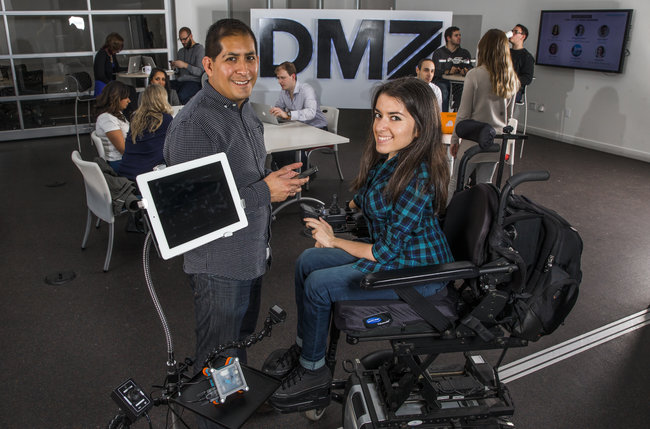written by Ahmed Saleh from the DMZ. We liked it so much we had to share.
Looking for an industry that’s ripe for disruption? Try accessibility; or rather, the lack thereof.
It’s 2016 and things have come a long way, but Canadians with disabilities still face a shockingly difficult time entering schools, transit and places of businesses, as well as accessing technology, public services and equal employment.
Since the provincial government announced the Accessibility for Ontarians with Disabilities Act (AODA), Ontario has become a world leader in improving access for the disabled, but it’s not enough.
“Yes, we have the AODA, but the government is not doing nearly enough to enforce the law,” says Maayan Ziv, founder of AccessNow. Maayan, who herself uses a wheelchair, took matters into her own hands; she created an app that uses crowdsourcing to collect and share accessibility information about restaurants, bars, transit stations and places of businesses in Toronto and beyond.
As one of the 1.85 million people in Ontario with a disability, Maayan, a Ryerson University alumna, faced personal difficulties finding reliable accessibility information. She’d hear that a restaurant was accessible, only to show up and find that wasn’t the case. Ryerson’s Master of Digital Media program helped her gain the skills and acquire the industry connections to turn this problem into a viable business solution.
Now a DMZ-based startup, the AccessNow platform and app allows users to search for a specific place or browse a map to discover what locations have the accessibility features they require. Anyone, from anywhere, can contribute and update information.
“Within five years, our goal at AccessNow is to share accessibility information worldwide,” Maayan says. “Picture millions of crowdsourced pins on a global map — that’s my vision.”
AccessNow’s technology supports access to physical places, but what if you can’t access the technology itself?
“Technology can be both a problem and a solution,” says Mauricio Meza, co-founder of Komodo OpenLab. Mauricio and his business partner, Jorga Silva, created technology that gives people with limited mobility the ability to use the same devices as everyone else. Their company brings digital accessibility to those unable to physically control devices by traditional means.
Komodo’s switch device, Tecla, enables users to control a range of media devices using the same controls used to operate wheelchairs. Enabling that access allows people with limited mobility to engage in a digital world and access digital products and services. Tecla is now used in more than 19 countries.
“The DMZ is an incredible network of innovators changing the world,” says Ziv. “Every day, people like myself encounter accessibility barriers. Imagine if every person affiliated with the DMZ added even one pin to our map. What an impact that could have.”

